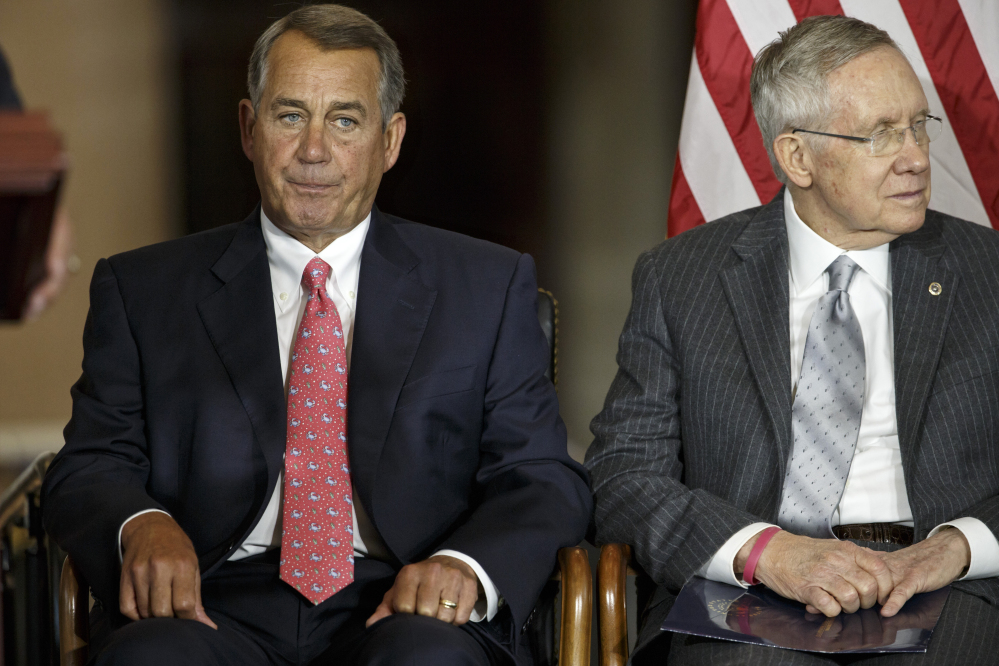WASHINGTON — On both ends of the Capitol, the parties controlling Congress are happily showcasing futility.
Less than two months before pivotal congressional elections, Republicans were set Thursday to muscle legislation through the House that would let insurers continue selling health coverage that falls short of standards required by President Barack Obama’s health care law. The measure was sure to pass but then die in the Democratic-run Senate, and the White House promised an Obama veto in any event.
Even so, the vote would let Republicans highlight their repeated efforts to debilitate the health care law. It will also dare Democrats to oppose an idea that appeals to some voters: Letting them keep insurance they already have, an Obama promise that proved untrue for some consumers.
The Senate approached a showdown vote on Democrats’ hopeless drive for a constitutional amendment allowing lawmakers to limit money-raising and spending by corporations and other big donors in election campaigns. The chamber was also revisiting a bill pressing employers to pay women as much as men — legislation blocked months ago by the GOP and with no chance for enactment.
Those measures could help Democrats appeal to women and reinforce their populist message opposing the clout big-spending special interests have in elections.
Each side criticized the other’s tactics.
“These are bills designed intentionally to fail so that Democrats can make campaign ads about them failing,” Senate Minority Leader Mitch McConnell, R-Ky., said of the Democratic measures.
“It’s a symbol of the continuing dysfunction of Congress, a bill that’s going to go nowhere,” Rep. Jared Polis, D-Colo., said of the House health care legislation.
Both sides’ measures represent policies each would like to enact if it had the votes. But with November’s elections approaching, they also were using a brief pre-election session of Congress to court voters and contributors — and fill time on the House and Senate floors while real work was underway elsewhere.
Behind the scenes, leaders are trying to put finishing touches on legislation preventing an Oct. 1 federal shutdown and financing the government into December, when Congress will return to work.
That’s been complicated by Obama’s efforts to rally support for a strategy for defeating the Islamic State group, which has overrun portions of Syria and Iraq and beheaded two American journalists. The president, who delivered a nationally broadcast speech on his plans Wednesday evening, wanted the spending bill to authorize him to train and equip Syrian rebels fighting those extremists.
The House health care bill would let insurers continue offering, through 2018, group medical policies that fall short of the coverage the 2010 health care law requires. Those requirements include prohibitions against charging higher premiums for women, older people or those with pre-existing medical conditions, and clamping a dollar ceiling on covered care.
The House easily approved a similar bill in November letting individuals continue buying policies deemed inadequate by the health care law. That measure drew support from 39 Democrats, despite an Obama veto threat.
Back then, millions of consumers holding substandard policies had received cancellation notices. Coupled with the inept rollout of the government’s online health care signup website, the law became a major political headache for Democrats — a liability that has eased as millions have enrolled for improved coverage.
In the Senate, the Democrats’ proposed constitutional amendment would let Congress and the states “set reasonable limits” on campaign spending and contributions by outside groups, candidates and wealthy individuals. It also would let legislators bar election spending by corporations.
That measure complements efforts by Senate Majority Leader Harry Reid, D-Nev., and other Democrats to ridicule Charles and David Koch, the billionaire industrialists whose contributions to conservative groups have helped finance millions of dollars in advertising opposing Democratic candidates.
Republicans say the measure would stifle free speech — the same rationale the Supreme Court has used in rulings easing decades-old campaign finance restrictions.
Constitutional amendments need two-thirds majorities of both the House and Senate. The Democratic proposal was certain to fall short of that requirement.
Also Wednesday, the Senate by a 73-25 vote cleared a procedural hurdle against a Democratic measure making it harder for companies to pay women less than men for similar jobs. Democrats say the bill would provide fairness for workers, while Republicans say it would hurt employers by making it harder for them to grant raises or trade flexible hours for lower salaries.
That bill also has no real chance to pass the Senate — or be considered by the House.
Copy the Story LinkSend questions/comments to the editors.



Success. Please wait for the page to reload. If the page does not reload within 5 seconds, please refresh the page.
Enter your email and password to access comments.
Hi, to comment on stories you must . This profile is in addition to your subscription and website login.
Already have a commenting profile? .
Invalid username/password.
Please check your email to confirm and complete your registration.
Only subscribers are eligible to post comments. Please subscribe or login first for digital access. Here’s why.
Use the form below to reset your password. When you've submitted your account email, we will send an email with a reset code.